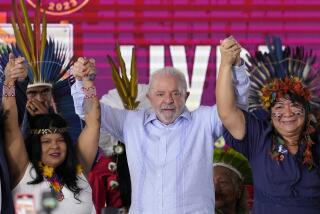Democracy Is Not a Given
- Share via
Who would have guessed this? After the Cold War, global capitalism offered a vision of world prosperity and, ultimately, democracy. Multinational companies and investors would pour technology and capital into poorer regions, creating a transnational mass market of middle-class consumers who would drive Toyotas, watch CNN, eat Big Macs--and, incidentally, demand more freedom.
Well, world trade and investment did indeed surge, but not with the expected consequences. Global capitalism is now destabilizing the economies of poor countries and inflicting large losses on investors in rich countries.
The idea was to open markets to trade and foreign investment. But now, markets are being shut. What went wrong?
On one level, the answer is simple. Countries became overdependent on foreign capital, which, having entered in huge amounts, is trying to leave the same way. What initially triggered the reversal was the recognition that much foreign money had been squandered through “crony capitalism” or misguided policies.
Now the fear of capital flight is feeding on itself, and spreading to Latin America.
If a few economies face this squeeze, it’s their problem; if many do, it’s everyone’s problem. The threat of capital flight has shoved so many countries toward austerity that it’s inducing a worldwide slump. Again, the process feeds on itself. Feeble economic growth has depressed prices of raw-material exports.Earning less abroad, these countries must slow their economies to cut imports. This depresses U.S. exports and the profits of multinational companies operating in these countries.
Thus does the Third World’s distress threaten the First World’s stock markets and prosperity. But global capitalism’s failure demands a deeper explanation, which is that market capitalism is not just an economic system. It is also a set of cultural values that emphasizes the virtue of competition, the legitimacy of profit and the value of freedom. These values are not universally shared.
As a result, spreading capitalism is not simply an exercise in economic engineering. It is an assault on other nations’ culture and politics that almost guarantees a collision. Even when countries adopt some trappings of capitalism, they may not embrace the basic values that make the system work. This is what happened. Led by the U.S., global agencies (the World Trade Organization, the International Monetary Fund) sought to persuade poorer countries to become more open to trade and global capital. These countries tried to maximize the benefits of the process while minimizing changes to their politics and commerce.
Mutual deception flourished. Countries like South Korea and Russia pretended that they were changing more than they had. American, European and Japanese bankers, executives and officials pretended the claims were true. Loans were made on the basis of incomplete or faulty financial statements--or on the faith that, if a loan went sour, someone (the government, the IMF) would cover them.
Global capitalism became a dangerous hybrid. Investors committed huge sums and expected high returns. But the money often went--through bank loans, bond issues and stock offerings--to borrowers who were not operating by strict rules of efficiency or profit and loss. “Crony” capitalism often meant corruption.
But capital flowed freely while optimism and self-deception prevailed. Banks collected interest on loans. “Emerging market” mutual funds rose, because local stocks were buoyed by new investment. While everyone enjoyed profits, there was a suspension of disbelief. Now comes the reckoning.
All their choices are bad. Malaysia’s exchange controls, by stiffing foreign creditors, risk loss of any future foreign investment. Still, some U.S. economists see currency controls as a temporary way of avoiding high-interest rate austerity. A gentler way to achieve the same result would be debt relief: Global bankers would write down loans, easing the repayment burden. But so far, banks have shown little interest.
A third approach is to attract new long-term capital to replace old short-term capital. Some of this is occurring. But developing countries are reluctant to sell too much of their economic bases to foreigners at fire-sale prices.
Global capitalism won’t soon regain its aura of infallibility. There was nothing wrong with the theory. Free trade and the free movement of capital would, in a world where everyone worshiped efficiency and profits, enrich all nations. The trouble is that we do not live in such a world.
More to Read
Inside the business of entertainment
The Wide Shot brings you news, analysis and insights on everything from streaming wars to production — and what it all means for the future.
You may occasionally receive promotional content from the Los Angeles Times.










